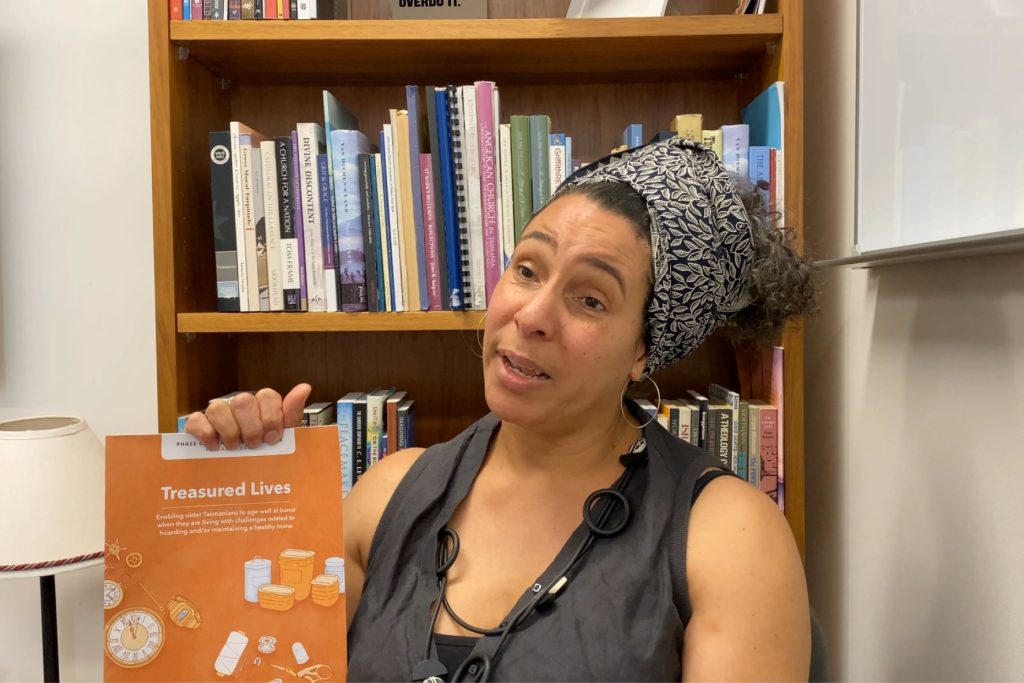Investing in solutions for a complex community concern
November 30, 2021
Governments have an opportunity to invest in prevention and early invention to support older Tasmanians who have challenges with hoarding.
New research from Anglicare Tasmania, released today, estimates there are around 5000 Tasmanians aged 50 years and over who are at increased risk due to hoarding and/or challenges maintaining a healthy home.
“Anglicare undertook this research because our frontline services are regularly seeing older people living in unsafe conditions,” said CEO Chris Jones. “These Tasmanians are often in poor health, at risk of serious injury due to trips and falls, and socially isolated.”
Anglicare has offered to brief the Minister for Mental Health and Wellbeing, Jeremy Rockliff about the findings in the Treasured Lives report and will seek his support for urgent action on the issue. The research recommends the State Government appoint a department to lead the development of a policy and practice framework, workforce training and a program of supports for older Tasmanians.
A request for investment of approximately $3.5 million over 5 years will feature in Anglicare’s State budget submission next month. Anglicare is also approaching the Federal Government to seek funding to pilot a program of support through Primary Health Tasmania.
Researcher, Lindsey Fidler from Anglicare’s Social Action and Research Centre (pictured below) said it made sense for governments to take a shared public health approach.
“Emergency and critical care costs are estimated at $56,800 for just one household with hoarding issues and/or challenges maintaining a healthy home,” she said. “This cost drops significantly when early intervention supports are given.”
The research recommends the establishment of professional networks in each region. These would include representatives of government, mental health services, aged care providers, disability support providers, housing and tenancy support services, the Tasmania Fire Service, councils, and animal welfare and management. The research also proposes the development of a digital hub of information for services, family members and carers.
“A properly funded and coordinated effort is needed in our State to respond to hoarding as a chronic illness,” said Ms Fidler. “It takes time for support services to build trust and rapport with people and work with them to reduce risks and improve their health and safety.”
Hoarding and/or challenges maintaining a healthy home are linked with poor health, increased risk of injury and hospitalisation, housing insecurity and homelessness, strained family relationships, community stigma and isolation.
“These risks tend to get worse as people age,” said Ms Fidler. “Unfortunately, many older people in Tasmania are not receiving any appropriate services and the full extent of their situation is often hidden behind closed doors.
Lessons from elsewhere show that with collaboration and appropriate investment, we can deliver the right supports to Tasmanians with these challenges. There are solutions to what is a complex community concern.
The Treasured Lives research is available at www.anglicare-tas.org.au/treasured-lives
Listen to Lindsey on ABC Radio
On Tuesday 30 November, Lindsey was interviewed on ABC Hobart’s Drive program with Kylie Baxter (2 minutes and 50 seconds in) and on ABC Northern Tasmania’s Drive program with Kim Napier (47 minutes and 10 seconds in.)
Hoarding disorder is a psychiatric condition that involves challenges with acquiring, sorting and/or discarding items or animals. Those living with this disorder hold meaning or emotional attachment to items. This attachment leads to significant emotional struggles about discarding items.
Challenges maintaining a healthy home describes an unsanitary environment that has arisen from extreme or prolonged neglect. It poses health and safety risks to the people and/or animals living there, as well as others in the community.


